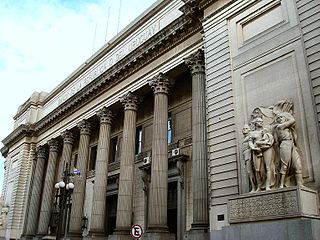
Banco Popular Español, S.A. was the sixth largest banking group in Spain before it was bought by Banco Santander as part of a rescue package in June 2017.

Álvaro Alfredo Magaña Borja was a Salvadoran lawyer, economist and politician who was the President of El Salvador from 1982 to 1984.

Banco Español de Crédito, S.A., “Spanish Credit Bank”) better known as Banesto, was a Spanish multinational financial services company. Prior to the Spanish Government's historical intervention in 1993, the very first in the history of banking, Banesto was the third-largest financial group in Spain, operating around 1,770 branches, as well as the fifth-largest company of the IBEX 35. The ambitious capital increase planned in 1993 by its Executive Chairman Mario Conde together with J.P. Morgan's vice-president Roberto Mendoza became the biggest restructuring plan in the history of Europe, involving asset sales and a rights issue of US$1.2 billion, after which Banesto was expected to become the largest financial firm in Europe. Although initially accepted by the Bank of Spain, it was later frustrated following intervention on the basis of financial transparency.
The Uruguay banking crisis was a major banking crisis that hit Uruguay in July 2002. In this, a massive run on banks by depositors most of them from neighboring Argentina caused the government to freeze banking operations. The crisis was caused by a considerable contraction in Uruguay's economy and by over-dependence on Argentina, which experienced an economic meltdown itself in late 2001. In total, approximately 1/3 of the country's deposits were withdrawn and five financial institutions were left insolvent.

Banco de la Nación Argentina is the national bank of Argentina, and the largest in the country's banking sector.

The Spanish property bubble is the collapsed overshooting part of a long-term price increase of Spanish real estate prices. This long-term price increase has happened in various stages from 1985 up to 2008. The housing bubble can be clearly divided in three periods: 1985–1991, in which the price nearly tripled; 1992–1996, in which the price remained somewhat stable; and 1996–2008, in which prices grew astonishingly again. Coinciding with the financial crisis of 2007–08, prices began to fall. In 2013, Raj Badiani, an economist at IHS Global Insight in London, estimated that the value of residential real estate has dropped more than 30 percent since 2007 and that house prices would fall at least 50 percent from the peak by 2015. According to Alcidi and Gros note, “If construction were to continue at the still relatively high rate of today, the process of absorption of the bubble would take more than 30 years.”
Banco Nacional de Obras y Servicios Públicos, SNC or Banobras is state owned development bank in Mexico. Its core business is sub national and project finance. It was founded in 1933 as Banco Nacional Hipotecario Urbano y de Obras Públicas, S.A by president Abelardo L. Rodríguez.

Banco de la República Oriental del Uruguay is a state-owned bank in Uruguay, founded in 1896 under the presidency of Juan Idiarte Borda. It is the most important Uruguayan bank with the largest number of customers.

The Central Bank of Uruguay (BCU) is the central bank of the Uruguay.

The Bank of the South or BancoSur is a monetary fund and lending organization established on 26 September 2009 by Argentina, Brazil, Paraguay, Uruguay, Ecuador, Bolivia and Venezuela with promises of initial capital of US$20 billion. Argentina, Venezuela, and Brazil were to have each pledged $4 billion, and Uruguay, Ecuador, Paraguay and Bolivia were to have contributed smaller amounts. The intention of the bank was to lend money to nations in the Americas for the construction of social programs and infrastructure. Documents establishing the bank as an entity were signed in 2007, and the agreement between the countries was finalized in 2009, but as of 2016, the bank had not been capitalized.
Alberto Fermín Zubiría Urtiague was a Uruguayan political figure, who served as the third President of the National Council of Government of Uruguay, the nominal head of a state in a nine-member executive council where the position of chairman rotated among the members for one year terms. Fermín served the term lasting from 1 March 1956 to 1 March 1957.

Banco Hipotecario is a commercial bank and mortgage lender in Argentina.
The Autonomous State Entities and Decentralized Services are a type of government-owned corporation typical of the Uruguayan state.

Banco del Estado de Chile, commercially operating under the brand BancoEstado, is the only Public Bank in Chile and was created by government decree in 1953. It provides financial services to consumers and companies, with a focus on national coverage in terms of geography and social sectors and a particular emphasis on the unbanked and small and medium enterprises, although it serves all types of businesses. It is the country's largest mortgage lender and largest issuer of debit cards. In addition, BancoEstado performs part of the Chilean government's financial activities through the accounts managed by the General Treasury of the Republic of Chile.
Uruguay had the first welfare state of Latin America under the presidency of José Batlle y Ordoñez in 1904. Government-owned corporations monopolize services such as electricity (UTE), land-line communications (Antel) and water (OSE). Antel competes with private corporations in the cell-phone lines and international telephony markets. In 1992, under the presidency of Luis Alberto Lacalle, the government attempted to privatize all its companies, following the neoliberal Washington Consensus. However, a referendum won by 75% of the population kept the companies in the hands of the government. By the end of his term, president Lacalle alleged that he had achieved a successful modernization of the companies, which had made them more efficient.
A Floor Clause, also known as ‘Clausula Suelo’ or ‘Suelo Hipotecario’, is simply a clause that has been inserted into variable rate mortgage agreements in Spain during the last 20 years that affects the interest rate payable on the mortgage. For most Spanish variables rate mortgages, the interest rate payable is calculated by reference rate to Euro Interbank Offered Rate (Euribor). If interest reference increases, then the interest on the mortgage also increases, likewise, if EURIBOR decreases, then interest payments will fall.










